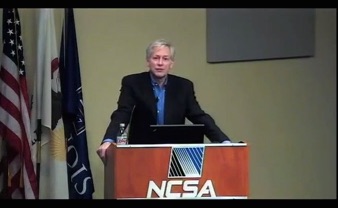 In this video from The Digital Future conference in Berlin, Ed Seidel, Director of the NCSA presents: The Impact of the Computing and Data Revolution on Science & Society.
In this video from The Digital Future conference in Berlin, Ed Seidel, Director of the NCSA presents: The Impact of the Computing and Data Revolution on Science & Society.
“The National Center for Supercomputing Applications (NCSA) is a hub of transdisciplinary research and digital scholarship where University of Illinois faculty, staff, and students, and collaborators from around the globe, unite to address research grand challenges for the benefit of science and society. Current research focus areas are Bioinformatics and Health Sciences, Computing and Data Sciences, Culture and Society, Earth and Environment, Materials and Manufacturing, and Physics and Astronomy. The Center also provides integrated cyberinfrastructure—computing, data, networking, and visualization resources and expertise that are essential to the work of scientists, engineers, and scholars at the University of Illinois at Urbana-Champaign and across the country. NCSA is also an engine of economic impact for the state and the nation, helping companies address computing and data challenges and providing hands-on training for undergraduate and graduate students and post-docs.”
NCSA director Edward Seidel is a distinguished researcher in high-performance computing and relativity and astrophysics with an outstanding track record as an administrator. In addition to leading NCSA, he is also a Founder Professor in the University of Illinois Department of Physics and a professor in the Department of Astronomy. His previous leadership roles include serving as the senior vice president for research and innovation at the Skolkovo Institute of Science and Technology in Moscow, directing the Office of Cyberinfrastructure and serving as assistant director for Mathematical and Physical Sciences at the U.S. National Science Foundation, and leading the Center for Computation & Technology at Louisiana State University. He also led the numerical relativity group at the Max Planck Institute for Gravitational Physics (Albert Einstein Institute) in Germany, and before that he was a senior research scientist leading the numerical relativity group at NCSA.



